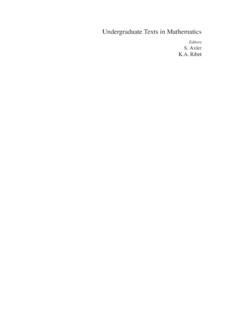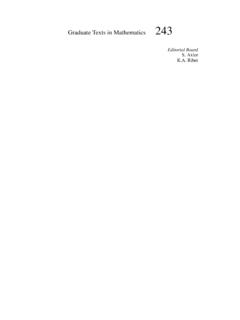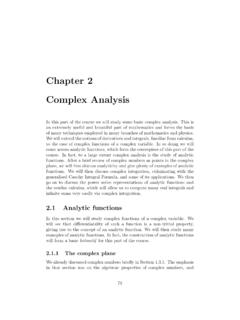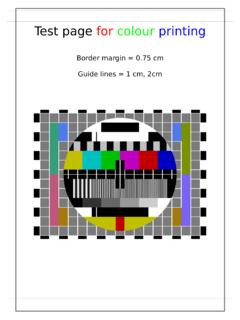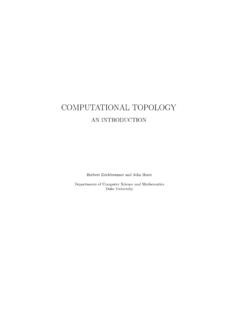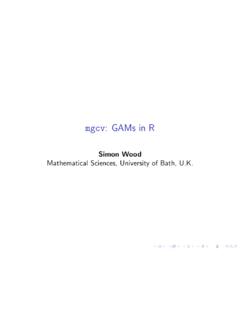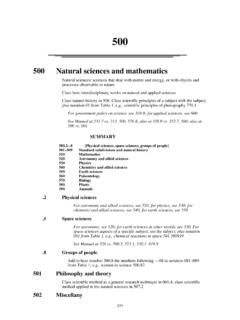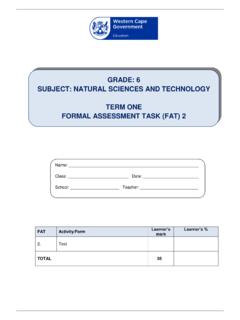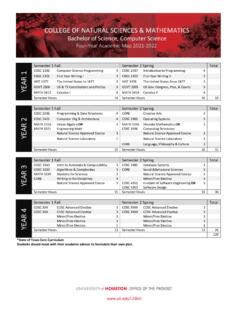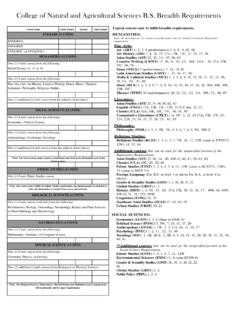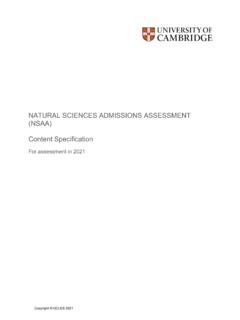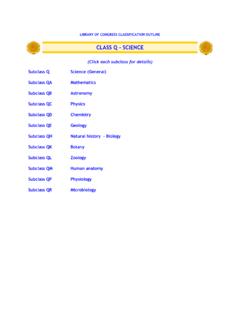Transcription of THE UNREASONABLE EFFECTIVENSS OF MATHEMATICS IN …
1 Reprinted from Communications in Pure and Applied MATHEMATICS , Vol. 13, No. I (February 1960). New York:John Wiley & Sons, Inc. Copyright 1960 by John Wiley & Sons, Inc. THE UNREASONABLE EFFECTIVENSSOF MATHEMATICS IN THE NATURALSCIENCESE ugene WignerMathematics, rightly viewed, possesses not only truth, but supreme beauty cold andaustere, like that of sculpture, without appeal to any part of our weaker nature, withoutthe gorgeous trappings of painting or music, yet sublimely pure, and capable of a sternperfection such as only the greatest art can show. The true spirit of delight, theexaltation, the sense of being more than Man, which is the touchstone of the highestexcellence, is to be found in MATHEMATICS as surely as in BERTRAND RUSSELL, Study of MATHEMATICS There is a story about two friends, who were classmates in high school, talking about their of them became a statistician and was working on population trends.
2 He showed a reprint to hisformer classmate. The reprint started, as usual, with the Gaussian distribution and the statisticianexplained to his former classmate the meaning of the symbols for the actual population, for theaverage population, and so on. His classmate was a bit incredulous and was not quite sure whetherthe statistician was pulling his leg. "How can you know that?" was his query. "And what is thissymbol here?" "Oh," said the statistician, "this is pi." "What is that?" "The ratio of thecircumference of the circle to its diameter." "Well, now you are pushing your joke too far," said theclassmate, "surely the population has nothing to do with the circumference of the circle.
3 " Naturally, we are inclined to smile about the simplicity of the classmate s approach. Nevertheless,when I heard this story, I had to admit to an eerie feeling because, surely, the reaction of theclassmate betrayed only plain common sense. I was even more confused when, not many days later,someone came to me and expressed his bewilderment [The remark to be quoted was made by when he was a student in Princeton.] with the fact that we make a rather narrow selectionwhen choosing the data on which we test our theories. "How do we know that, if we made a theorywhich focuses its attention on phenomena we disregard and disregards some of the phenomena nowcommanding our attention, that we could not build another theory which has little in common withthe present one but which, nevertheless, explains just as many phenomena as the present theory?
4 " Ithas to be admitted that we have no definite evidence that there is no such theory. The preceding two stories illustrate the two main points which are the subjects of the presentdiscourse. The first point is that mathematical concepts turn up in entirely unexpected , they often permit an unexpectedly close and accurate description of the phenomena inthese connections. Secondly, just because of this circumstance, and because we do not understandthe reasons of their usefulness, we cannot know whether a theory formulated in terms ofmathematical concepts is uniquely appropriate. We are in a position similar to that of a man whowas provided with a bunch of keys and who, having to open several doors in succession, always hiton the right key on the first or second trial.
5 He became skeptical concerning the uniqueness of thecoordination between keys and doors. Most of what will be said on these questions will not be new; it has probably occurred to mostscientists in one form or another. My principal aim is to illuminate it from several sides. The firstpoint is that the enormous usefulness of MATHEMATICS in the natural sciences is something borderingon the mysterious and that there is no rational explanation for it. Second, it is just this uncannyusefulness of mathematical concepts that raises the question of the uniqueness of our physicaltheories. In order to establish the first point, that MATHEMATICS plays an unreasonably important rolein physics, it will be useful to say a few words on the question, "What is MATHEMATICS ?
6 ", then,"What is physics?", then, how MATHEMATICS enters physical theories, and last, why the success ofmathematics in its role in physics appears so baffling. Much less will be said on the second point:the uniqueness of the theories of physics. A proper answer to this question would require elaborateexperimental and theoretical work which has not been undertaken to date. WHAT IS MATHEMATICS ? Somebody once said that philosophy is the misuse of a terminology which was invented just for thispurpose.[This statement is quoted here from W. Dubislav s Die Philosophie der Mathematik in derGegenwart (Berlin: Junker and Dunnhaupt Verlag, 1932), p.]
7 1.] In the same vein, I would say thatmathematics is the science of skillful operations with concepts and rules invented just for thispurpose. The principal emphasis is on the invention of concepts. MATHEMATICS would soon run outof interesting theorems if these had to be formulated in terms of the concepts which already appearin the axioms. Furthermore, whereas it is unquestionably true that the concepts of elementarymathematics and particularly elementary geometry were formulated to describe entities which aredirectly suggested by the actual world, the same does not seem to be true of the more advancedconcepts, in particular the concepts which play such an important role in physics.
8 Thus, the rules foroperations with pairs of numbers are obviously designed to give the same results as the operationswith fractions which we first learned without reference to "pairs of numbers." The rules for theoperations with sequences, that is, with irrational numbers, still belong to the category of ruleswhich were determined so as to reproduce rules for the operations with quantities which werealready known to us. Most more advanced mathematical concepts, such as complex numbers,algebras, linear operators, Borel sets - and this list could be continued almost indefinitely - were sodevised that they are apt subjects on which the mathematician can demonstrate his ingenuity andsense of formal beauty.
9 In fact, the definition of these concepts, with a realization that interestingand ingenious considerations could be applied to them, is the first demonstration of theingeniousness of the mathematician who defines them. The depth of thought which goes into theformulation of the mathematical concepts is later justified by the skill with which these concepts areused. The great mathematician fully, almost ruthlessly, exploits the domain of permissiblereasoning and skirts the impermissible. That his recklessness does not lead him into a morass ofcontradictions is a miracle in itself: certainly it is hard to believe that our reasoning power wasbrought, by Darwin s process of natural selection, to the perfection which it seems to , this is not our present subject.
10 The principal point which will have to be recalled later isthat the mathematician could formulate only a handful of interesting theorems without definingconcepts beyond those contained in the axioms and that the concepts outside those contained in theaxioms are defined with a view of permitting ingenious logical operations which appeal to ouraesthetic sense both as operations and also in their results of great generality and simplicity. [ , in his Personal Knowledge (Chicago: University of Chicago Press, 1958), says: "All thesedifficulties are but consequences of our refusal to see that MATHEMATICS cannot be defined withoutacknowledging its most obvious feature: namely, that it is interesting" (p.)]
